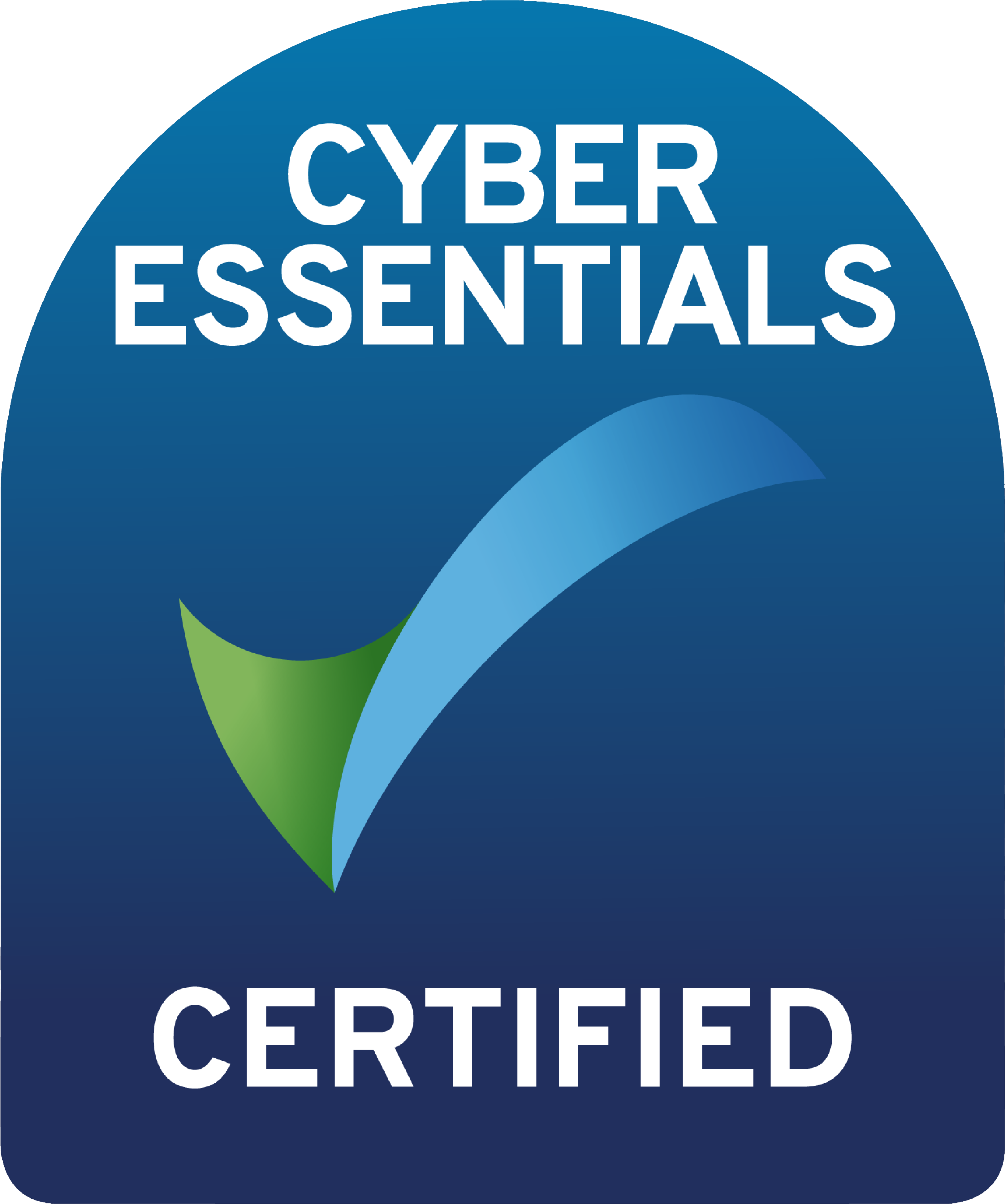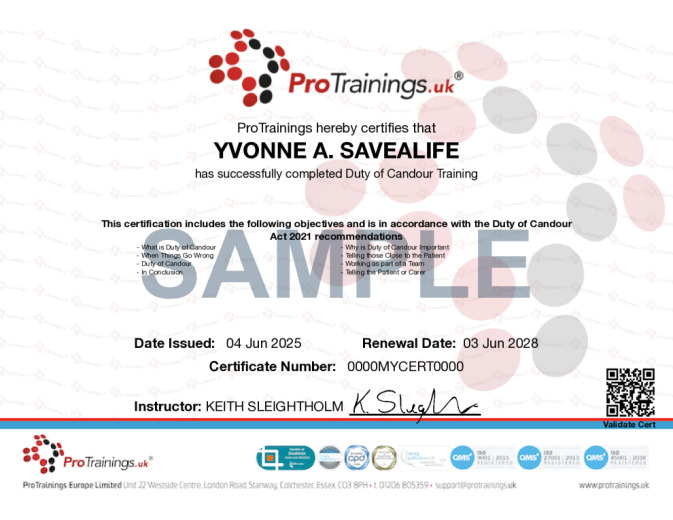Duty of Candour
Online Training Course
No matter which sector you are working in, mistakes are made. That's just human nature, however, since we're dealing with people's lives within the healthcare sector, mistakes must be reported efficiently, accurately and honestly. Take a second to imagine how you would feel if a close family member or a loved one was receiving health care and a mistake was made, you would want to know what's happened regarding their care and what if any, implications have arisen due to the mistake.
Knowing what happened will help to put the patient and their loved ones at ease. It may not be easy for you, and it will probably be a very uncomfortable conversation, however, having that conversation is the right thing to do for both you and the patient. Not only will conducting a professional duty of candour be beneficial for your patients but will also protect you from any potential litigation. If, for example, you gave someone the wrong dose of medication and the patient had some adverse reaction, but you didn't tell anyone you're putting both yourself and the patient in danger. However, if you inform the correct person and did everything possible for the patient, both their prognosis and your security will be much better than if not.
Within the healthcare setting, most people work as part of a multi-disciplinary team, therefore, upholding a reasonable duty of candour is a team effort and must be coordinated effectively. Duty of candour must be maintained throughout the entire course of care, even from before the care has been given. Ensuring that the patient understands what treatments will be given to them also falls under the duty of candour, as unless requested by the patient withholding information from them is not in their best interest. They must also be made aware of any potential risks as well as the chances of these risks occurring.
Duty of candour also includes near-misses, meaning an event that had the potential to result in a negative situation had things been slightly different. In some cases, investigations may be made into the causes and consequences of the incident, whether that be a near miss or an actual mistake. It is under a proper duty of candour to be as helpful as possible in these investigations, not to falsify the facts, to make sure that as much relevant information has been given as possible. So in summary, duty of candour is the standard that all healthcare professionals should adopt relating to being as open, honest and empathetic with the patient as possible. This runs right through the treatment from when the treatment is first proposed, right through to the end, and especially if any mistakes have been made.

Video Playtime
22 minutes
Video Count
9 videos
Audio
English
Captions
English
Proof of Completion
Certificate
This Course Includes:
- 2.0 hrs CPD Certificate
- Evidence Based Training Certificate
- Instant printable wall certificate
- 24/7 on-demand video
- Access on mobile
- Weekly refresher video
- Expiration reminder
- Student manual
over 3 million certifications issued to date
Why ProTrainings?
Convenience
Train Anywhere, On Any Device
Master Quality
Expert Instructors for Every Subject
Speed
Same-Day Completion
Trusted
Compliant & Secure
Who needs Health and Social Care training?
Most people take Health and Social Care training as a requirement for their job or for their personal life. Whether you work in healthcare or another profession or are simply looking for a new qualification, ProTrainings has the course that is suitable for you! Online courses allow you to train at your own pace, in your own time.
Some professionals that may need a Health and Social Care course include:
More about this course
No matter which sector you are working in, mistakes are made. That's just human nature, however, since we're dealing with people's lives within the healthcare sector, mistakes must be reported efficiently, accurately and honestly. Take a second to imagine how you would feel if a close family member or a loved one was receiving health care and a mistake was made, you would want to know what's happened regarding their care and what if any, implications have arisen due to the mistake.
Knowing what happened will help to put the patient and their loved ones at ease. It may not be easy for you, and it will probably be a very uncomfortable conversation, however, having that conversation is the right thing to do for both you and the patient. Not only will conducting a professional duty of candour be beneficial for your patients but will also protect you from any potential litigation. If, for example, you gave someone the wrong dose of medication and the patient had some adverse reaction, but you didn't tell anyone you're putting both yourself and the patient in danger. However, if you inform the correct person and did everything possible for the patient, both their prognosis and your security will be much better than if not.
Within the healthcare setting, most people work as part of a multi-disciplinary team, therefore, upholding a reasonable duty of candour is a team effort and must be coordinated effectively. Duty of candour must be maintained throughout the entire course of care, even from before the care has been given. Ensuring that the patient understands what treatments will be given to them also falls under the duty of candour, as unless requested by the patient withholding information from them is not in their best interest. They must also be made aware of any potential risks as well as the chances of these risks occurring.
Duty of candour also includes near-misses, meaning an event that had the potential to result in a negative situation had things been slightly different. In some cases, investigations may be made into the causes and consequences of the incident, whether that be a near miss or an actual mistake. It is under a proper duty of candour to be as helpful as possible in these investigations, not to falsify the facts, to make sure that as much relevant information has been given as possible. So in summary, duty of candour is the standard that all healthcare professionals should adopt relating to being as open, honest and empathetic with the patient as possible. This runs right through the treatment from when the treatment is first proposed, right through to the end, and especially if any mistakes have been made.
- Find out what other courses are available as video online, blended and classroom courses nationally - our course finder
- Sign up for free Student First Aid - use code SCH-376-61-571
- Visit the First Aid Show free for first aid and medical videos
- Woundclot - haemostatic gauze for all types of bleeding
Reviews
Frequently Asked Questions
What is CPD and why is having Certified CPD important?
CPD stands for Continuous Professional Development and is required in many business sectors. Even if you do not require a set CPD credit level, having Certifed CPD ensures the quality of training. ProTrainings are the highest gold standard of CPD ensuring that all courses are externally verified and mapped to the highest levels.
What is "SCORM ready" and will courses run on a LMS?
SCORM Ready means that online courses can run on any compatible Learning Management System (LMS). SCORM courses run seamlessly on your existing LMS system without a separate login so staff only login using the existing company system. ProTrainings online courses have an advanced SCORM ready system to give more features than any other company.
Do I receive a certificate after completing your online training?
Yes, when you complete the online course you will be able to download and print a compliant completion certificate, evidenced-based learning statement to confirm course content and a certified CPD statement. There is no extra charge for the certificate. You can also buy a printed certificate to be posted to you for a small extra fee.
What training courses do you offer and how are they delivered?
We offer a full range of training courses across all business sectors as video online, blended and nationwide at your business or our local training centres. With over 350 courses you can learn at a time and place that meets your busy schedules and save money on travel and costs away from the office.
Group Trainings for your Organisation

.jpg)












